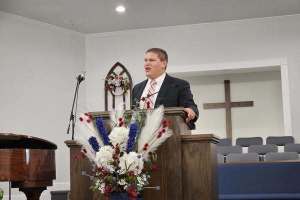GOP Candidates Flying Over Iowa in Search of Greener Pastures in N.H.
Republican candidates are aggressively vying for voter and media attention and coverage, especially in Iowa. However, some are bypassing the Hawkeye state and its traditionally Christian conservative Republican voter base for the fiscal conservatives of New Hampshire.
Today’s entry of former Pennsylvania Senator Rick Santorum, while expected, officially increases a roster eager to take on President Obama in Iowa.
But first they must take on each other, expectant social conservatives and tea-party activists who are more interested in the debt ceiling than abortion.
Over the past several years, states have taken steps to move their primary dates up to be more relevant in presidential primaries. What is known as “Super Tuesday,” usually held in February or March of a presidential election year, can be a make or break day for mid-tier candidates, often forcing low performers out of the race as fundraising dollars dwindle.
Yet Iowa and New Hampshire usually set an early stage for those with presidential aspirations.
Iowa’s unique caucus structure is frustrating to many candidates and their ground operatives for many reasons, but most important is the massive amount of time and money they must devote to one state or in some instances, one county.
Ward Baker, a national political strategist who has worked in a number of national campaigns, said the most challenging part is “keeping people on your side.” Candidates are known to spend an hour or more in some grandmother’s living room, convincing her why they are the best candidate and deserve her vote.
“Over a three-day period in 2006, I saw Romney, Huckabee and Frist spend hours at events with only 30 people in attendance. It was more like they were running for the state house instead of the White House,” said Baker. “You may have their commitment for a day or two, or until the next round of candidates comes through town. It just costs a ton of money to keep one vote in Iowa. Some candidates spend 70 percentage of their budget in hopes of doing well in Iowa.”
Former governors Mitt Romney and Jon Huntsman, both Mormon, are not as excited about Iowa and other conservative states as Santorum, Pawlenty and others who espouse more evangelical, faith-based messages are.
Ralph Reed, whose Faith and Freedom Coalition just concluded their conference with over 1,400 enthusiastic socially conservative voters in attendance, feels strongly about the strength of the “value-voter” in the 2012 elections.
“It’s a free country and candidates can run their campaigns as they see fit,” Reed remarked, “but there’s no way around the fact that you must win your fair share of conservative voters.”
Reed also referenced the number of primary states with high percentages of socially conservative voters. “You can choose to skip Iowa for New Hampshire, but you’ll find an evangelical base in South Carolina and Florida, where 35 to 40 percent of primary votes are socially conservative, and then there’s Ohio and Missouri.”
Former New York Mayor Rudy Giuliani, also weighing a decision to enter the race, found that picking and choosing voters is a difficult strategy.
Other strategists believe those like Romney and Gingrich who have higher name recognition have an easier road to travel than lesser known candidates.
Tim Pawlenty, the former Minnesota governor is working hard to increase his name ID in Iowa and Santorum, Sarah Palin, if she chooses to run, and others will be knocking on doors and attending cookouts at a rapid pace in the coming months.
Rep. Michele Bachmann is expected to announce her intentions to run soon and will also be spending time convincing Iowa voters of her conservative background.
The 2012 Iowa caucuses will take place on February 6, 2012.





























